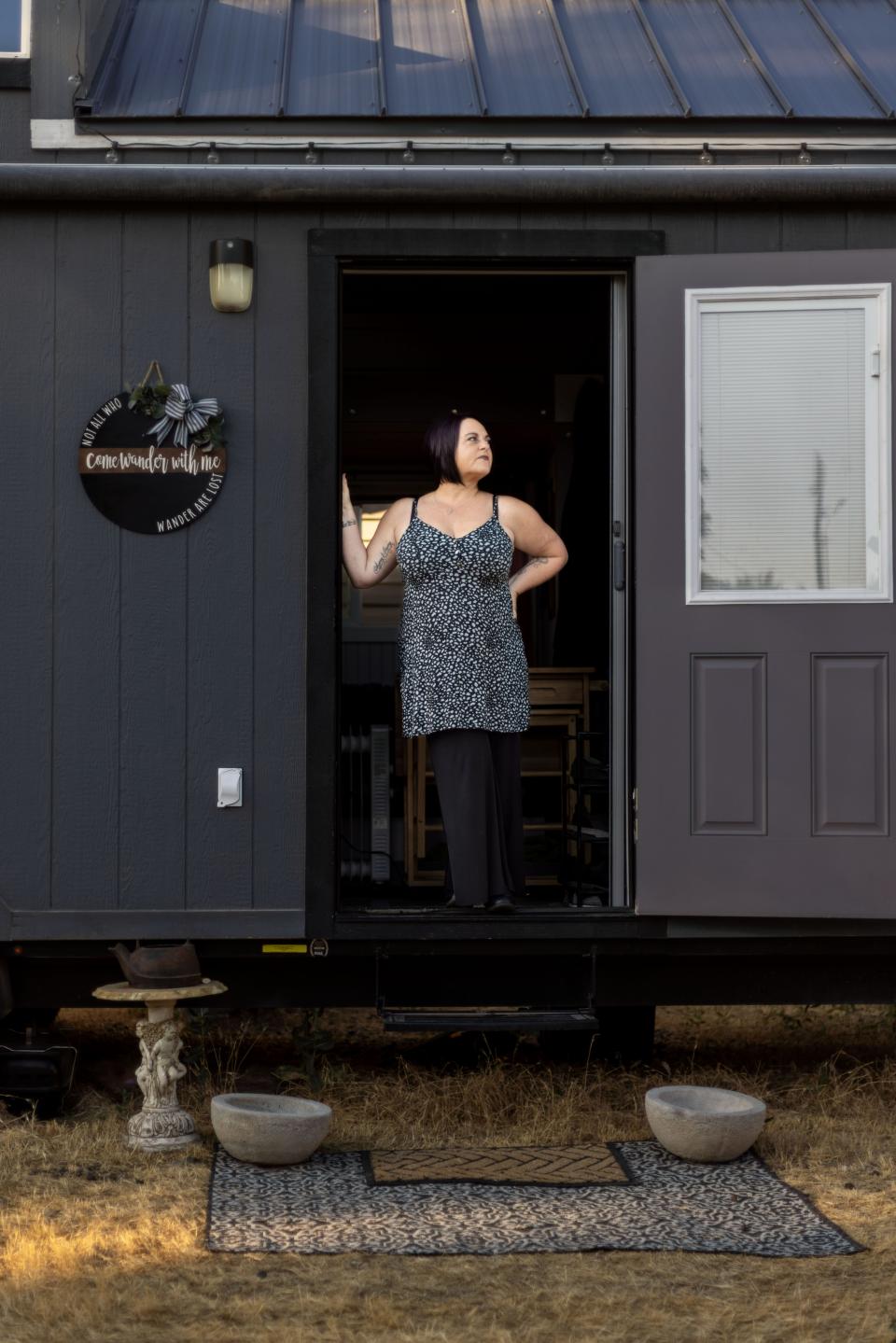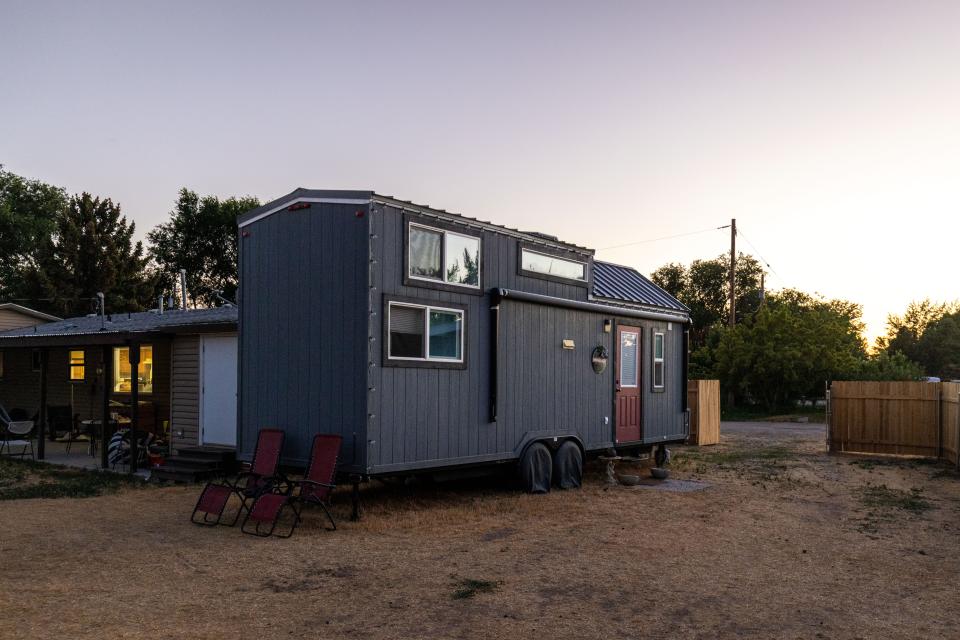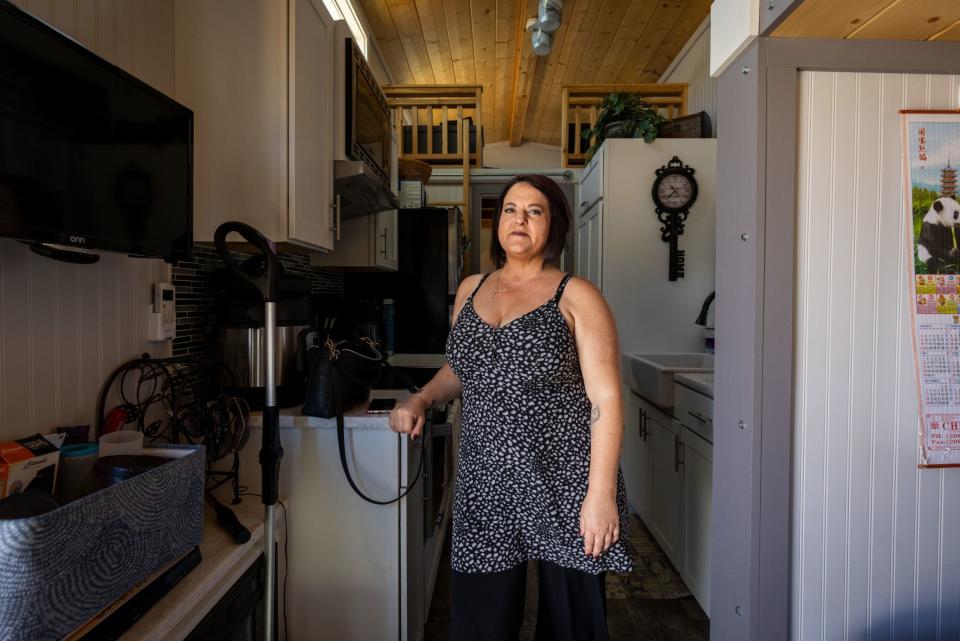Her 252-square-foot tiny home was her humble castle. Then the city forced her out.
Soaring real estate prices have pushed many families out of the housing market, but Chasidy Decker found a simple solution: She bought a tiny home on wheels.
The professionally built structure has everything Decker needs packed into 252 square feet. The problem for Decker and many others who own tiny homes is finding places to park where the zoning police will leave them alone. Decker thought she found a safe place when she signed a one-year lease to stay next to a home with hookups for water, sewage and electricity in Meridian, Idaho.
Parking her tiny house there was legal. The city’s zoning code allows boats, trailers, recreational vehicles and tiny homes on wheels to park indefinitely. The catch is that nobody can live in them, which means Decker broke the laws the first night she slept in her own bed in the new location.
Government-imposed homelessness
Showing little mercy, the zoning police effectively evicted Decker on Aug. 1, giving her and her small dog, Skiba, and her cat, Jax, no permanent place to live in the middle of a housing crisis that has hit Boise hard.
The region has RV parks, but they are full, and many do not allow tiny homes anyway.
My students struggle to pay for college: Loan forgiveness doesn't fix the system

Rather than accept the government-imposed homelessness, Decker fought back with a constitutional lawsuit that asserts her right to live within her means in a safe manner that hurts no one. Our public interest law firm, the Institute for Justice, represents her and her landlord, who lost the rental income he expected when he bought the property and leased the space to Decker.
Even as housing prices have climbed, policymakers continue to enforce their vision of acceptable living, which favors single-family homes with private driveways and well-manicured lawns on quiet streets with sidewalks, parks and no signs of commercial activity.
Cities have cracked down on a wide range of home features:
►A front yard vegetable garden in Florida.
►A backyard chicken coop in California.
►A home-based day care service in Texas.
►A free food pantry in Washington state.
Zoning officials likely don’t see themselves as elitists when they impose their values on others. Yet they punish anyone who refuses to conform – or anyone who cannot afford to conform. Code enforcement that pushes distressed families out of safe arrangements and onto the street is particularly troubling.
Why force braiders into beauty school?: Expensive mandates pile onto student debt crisis.

Meridian does this when it targets occupied tiny homes on wheels. Other cities limit apartment construction, harass renters with onerous inspection programs or adopt square-footage minimums that force people into bigger properties than they actually need. Besides abusing government authority, zoning officials who enforce these laws demolish private solutions to public problems.
Not even charity projects are immune to tiny home animus
Sometimes the demolition is literal. Las Vegas brought bulldozers in recently to flatten a community of tiny homes that a nonprofit organization had built on donated land. The units were micro – just 50 square feet – but they represented a fresh start for the previously homeless occupants.
Opinion alerts: Get columns from your favorite columnists + expert analysis on top issues, delivered straight to your device through the USA TODAY app. Don't have the app? Download it for free from your app store.
Another charity, Tiny House Hand Up, applied for permission to build Southern-style cottages as small as 540 square feet on undeveloped land in Calhoun, Georgia. The units would have been affordable, sustainable and safe. But local officials rejected the proposal in 2021 based on a rigid rule that prohibits the construction of any home smaller than 1,150 square feet.
For perspective, the average U.S. home did not pass the 1,150-square-foot threshold until about 1940. Homes and lots have gotten bigger since then, as families have gotten smaller. Local officials want everyone to live large or live somewhere else.
Counseling is speech: Moving to a new state shouldn't force you to say goodbye to your therapist.
A few leaders are charting a better path forward
Despite the widespread discrimination against people who struggle to keep up, some policymakers are starting to rethink those codes:
►Nevada passed a law last year that will require cities and counties to make room for tiny houses by 2024.
►Los Angeles opened a tiny home village last fall.
►Colorado, Minnesota and Oregon, along with other states, have taken steps to legalize tiny homes on wheels.
Cost is just one reason for the shift toward “living tiny.” Focus on the environment and the need for sustainable housing is another. Some people just want a simpler life. They downsize intentionally, even when they could afford more.

Regardless of the motivation for choosing a tiny home, the zoning police should not interfere with private choices without good reason.
Decker was happy with her humble arrangement. She had no circular driveway, marble staircase or walk-in closets. But she also had no mortgage. Her home was her castle, even if the city would rather she be homeless than live in it.
Bob Belden is an attorney and Daryl James is a writer at the Institute for Justice in Arlington, Virginia.
You can read diverse opinions from our Board of Contributors and other writers on the Opinion front page, on Twitter @usatodayopinion and in our daily Opinion newsletter. To respond to a column, submit a comment to letters@usatoday.com.
This article originally appeared on USA TODAY: Tiny homes are legal. These cities say living in them is not.

